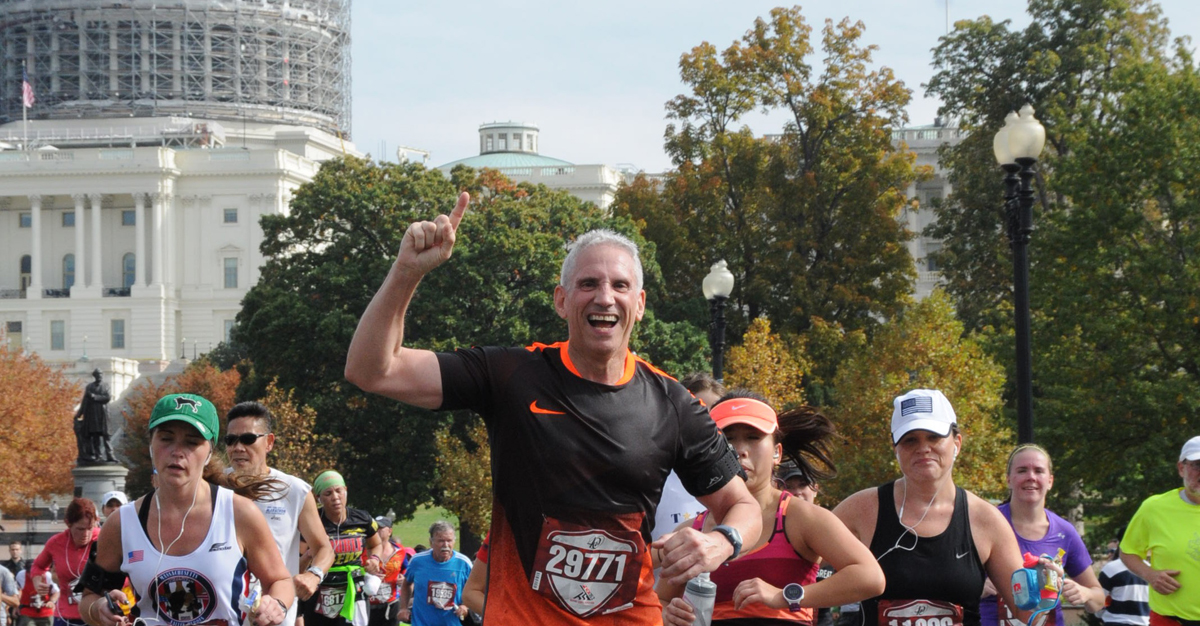ERO Emergency Management Specialist, Army Vet runs first Marine Corps Marathon
The tears began to fill the eyes of Rich Nicorvo around the “Blue Mile” of the 40th Marine Corps Marathon course, a section that begins at mile 12, where fallen service members are commemorated along the roadway.
Sure, the physical toll of running his first marathon on Sunday, Oct. 25, was grueling, but the emotions of seeing the pictures and names of the fallen warfighters along the route and then running past the families of those service members who’d lined the streets waving American flags was unlike anything he’d felt during the race up to this point.
“That was tough,” Nicorvo said. “Whenever I run these races I’m so inspired by stories of fallen service men and women and the wounded warriors who are out there running, or wheeling, with all their heart and really suffering through physical pain. I think of them when my legs are getting tired and I’m starting to run out of gas. They help me drive on.”
Nicorvo, an Emergency Management Specialist with the Incident and Special Response Unit for U.S. Immigration and Customs Enforcement’s (ICE) Enforcement and Removal Operations (ERO), is an Army veteran who began his law enforcement career more than 30 years ago. Throughout his career, running was a regular part of his fitness regimen only because he had to. However, it wasn’t until he moved to the Washington, D.C., area in 2010 to join ICE that he really became serious about recreational running.
“Moving up here, I knew that the Army Ten Miler was a pretty big deal,” Nicorvo said. “It’s something that I thought I could try. I started running more races and really enjoyed it, but I never thought I’d get to the point where I’d actually do a marathon.”
After reading more about the annual Marine Corps Marathon, which covers 26.2 miles through Washington, D.C. and Arlington, Virginia, Nicorvo decided in March to take a chance and enter the lottery to get a spot in the race.
After being selected, Nicorvo followed an online training program for six months to prepare for the marathon. Mondays would be his off day. For the rest of the week, he would get up at 4:30 a.m. and do everything from track and road work to cross training exercises. Sundays were reserved for distance running to increase his endurance sometimes requiring him to wake up at 2:30 a.m. to eat breakfast before hitting the road at 6:30 a.m.
“After I got up to 20 miles, that’s when it really hit me and I thought ‘hey, I can really do this,’”
Having run the Army Ten Miler five times before, Nicorvo was familiar with part of the course. As he would soon find out, a marathon is an entirely different challenge ― one that he would successfully face. Nicorvo faced some foot pain as the race progressed, which required him to take several walk breaks after mile 22. He completed the marathon in 5 ½ hours.
Nicorvo credits his wife with supporting him throughout the training and during the race, as well as colleague Miguel Pérez-Otero, a desk officer with ERO’s Field Operations Division.
“He was a great resource to me and someone I could bounce things off of,” Nicorvo said. “He’s an experienced runner so he was able to mentor me along through the process.”
With the completion of his first marathon, Nicorvo successfully ran a race sponsored by every branch of the armed services this year. As he reflected on his efforts, the post-race pain was telling him that he wouldn’t run a marathon again. Yet the overall emotional and physical reward of completing his first marathon lets him know that this won’t be his last.
At 55, the retired police captain compared his “awesome experience” to the evolution of his law enforcement career; from learning the ropes as a young Army vet, to seeing the fruits of his labor more than 30 years later.
In preparation for the marathon, “You’re learning the right way to run, the correct shoes to wear and what to eat,” Nicorvo said. “It gives you such a feeling of accomplishment that you’re able to push through. When you see the final results, it was really worth it.”


